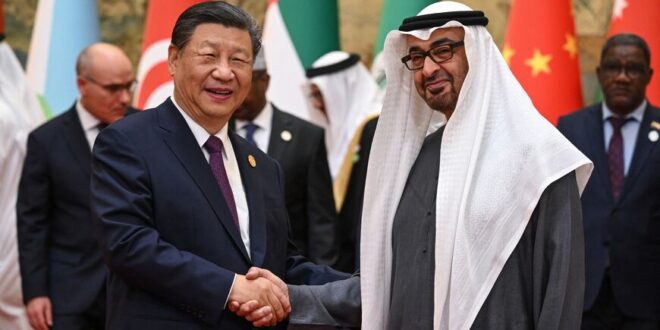Iran seized control of Abu Musa and the Greater and Lesser Tunbs several decades ago, though the United Arab Emirates has long claimed sovereignty over the islands, a claim backed by Gulf states and Russia.
China reiterated on Monday its support for the United Arab Emirates regarding its dispute with Iran over several islands in the Gulf, setting up a rare instance of public disagreement between Beijing and Tehran.
After Tehran summoned the Chinese ambassador over the weekend, the Chinese Foreign Ministry spokesperson Mao Ning defended Beijing’s recent statement backing the UAE’s sovereignty over the Abu Musa and the Greater and Lesser Tunbs islands, saying during a press briefing that the dispute should be resolved in a “peaceful way.”
What happened: China hosted Arab leaders, including UAE President Mohammed bin Zayed Al Nahyan, in Beijing last week for the China-Arab States Cooperation Forum. The event consisted of a series of meetings between Chinese and Arab officials on ways to strengthen ties between China and the region.
The UAE and China released a joint statement on Sunday following the conclusion of the forum. The statement included a declaration of support for the UAE’s claim over the Abu Musa and the Greater and Lesser Tunbs in the Gulf.
“The People’s Republic of China also expressed its support for the efforts of the United Arab Emirates to reach a peaceful solution to the issue of the three islands, the Greater Tunb, the Lesser Tunb and Abu Musa, through bilateral negotiations in accordance with the rules of international law and to resolve this issue in accordance with international legitimacy,” read the statement published by the official Emirates News Agency.
The Abu Musa and the Greater and Lesser Tunbs islands are located in the Gulf between Iran and the UAE. Iran, then ruled by Shah Mohammad Reza Pahlavi, seized control of the islands on Nov. 30, 1971 — just two days before the UAE became a country. Iran has administered the islands ever since, but the UAE claims to be their rightful owners.
Iran summoned China’s ambassador in Tehran, Cong Peiwu, over the declaration the same day. In a meeting, Iranian Foreign Ministry official Mohammad AliBek “stressed that the three Iranian islands in the Persian Gulf belong to the Islamic Republic of Iran, and Iran rejects any claim from any side in that regard,” the official Islamic Republic News Agency reported.
AliBek additionally noted Iran’s “special and privileged” relationship with China and said they expect the People’s Republic to reverse its position.
“Considering the strategic cooperation between Iran and China, he said that the Chinese government is expected to correct its position on this issue,” reported the agency.
China stood by its statement on Monday, and Mao told reporters that the People’s Republic has been “consistent” with regard to the islands.
“We call on parties concerned to resolve differences in a peaceful way through dialogue and consultation. The joint statement between China and the UAE is consistent with China’s position on this issue,” said Mao, according to a transcript from the ministry.
Mao described China’s relations with Iran as “solid,” despite the spat.
“China-Iran relations are solid. We value our comprehensive, strategic partnership with Iran,” he added.
Why it matters: This is not the first public disagreement between Iran and the UAE over the islands. In August of last year, Iran’s Islamic Revolutionary Guard Corps held a naval drill on Abu Musa. The following month, Iranian government foreign policy adviser Ali Akbar Velayati told Al Jazeera that “repeated claims by the UAE about the three islands will destabilize the region’s security.”
Arab Gulf states have long backed the UAE’s claim, and the issue has threatened Iran’s detente with the Gulf, Al-Monitor’s correspondent in Tehran reported in September of last year. Tensions between Tehran and the Gulf have cooled somewhat since the China-brokered deal that reestablished relations between Saudi Arabia and Iran in March of 2023.
Like China, Russia has recently expressed support for the UAE’s claim to the islands. In December, the Russian-Arab Cooperation Forum similarly backed the Emirates over the issue. The move followed Russia and the Gulf Cooperation Council calling for a “peaceful solution” to the dispute last July, leading Iran to summon the Russian ambassador.
Iran-China relations remain robust, particularly when it comes to energy. During the first quarter of 2024, Iran averaged daily crude oil exports of 1.56 million barrels, nearly all of it going to China. This level constituted a six-year high, according to data from the cargo tracking firm Vortexa cited by the Financial Times.
On the political front, the late Iranian President Ebrahim Raisi visited China in February of 2023, a month before the Saudi deal was announced. China and Iran additionally signed a 25-year cooperation agreement in 2021.
Despite overall friendly ties, Beijing’s pursuit of good relations with Arab states and concern about Western sanctions on Iran have led to “lukewarm economic engagement” between China and Iran, Yun Sun wrote for Al-Monitor last month.
 Eurasia Press & News
Eurasia Press & News




